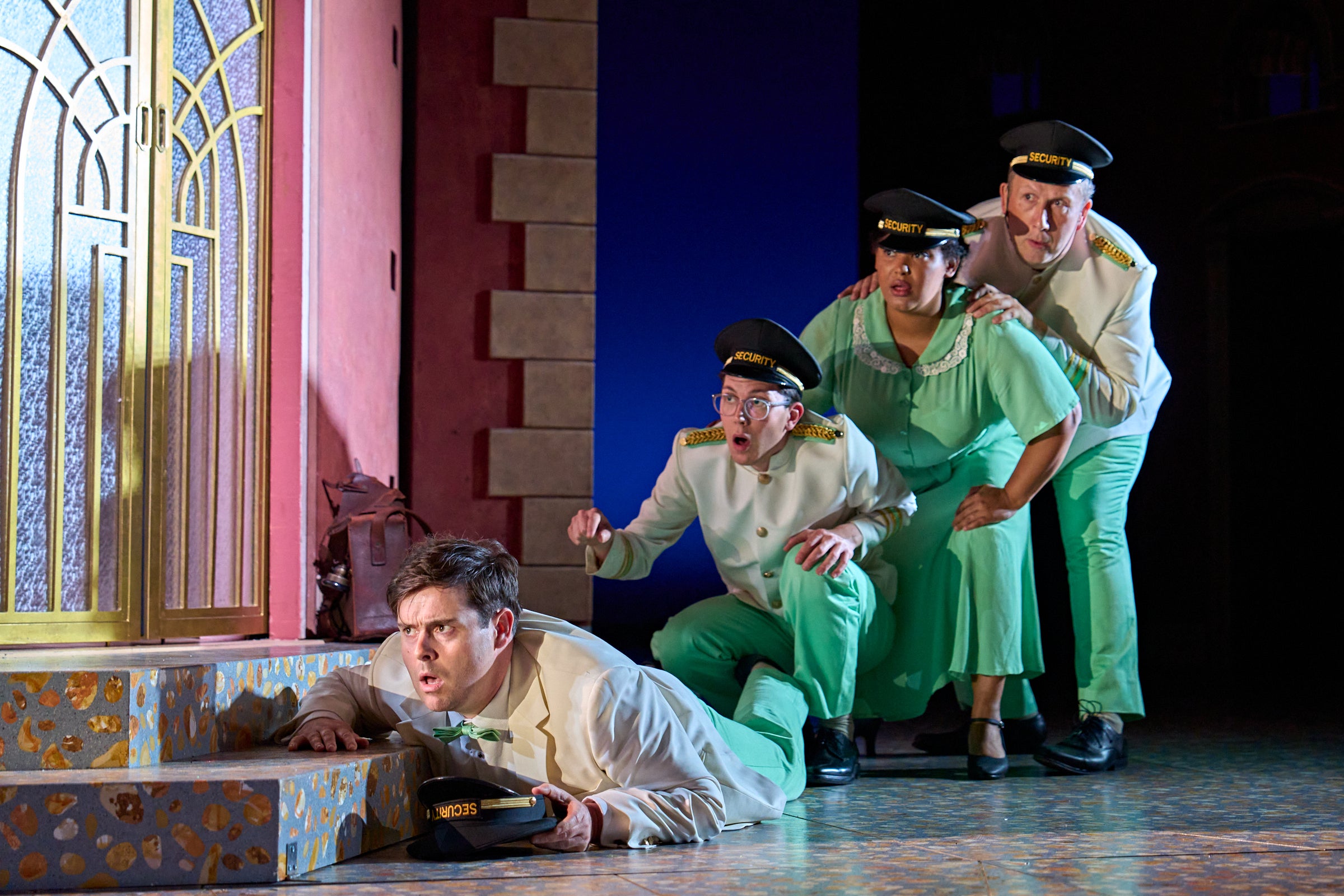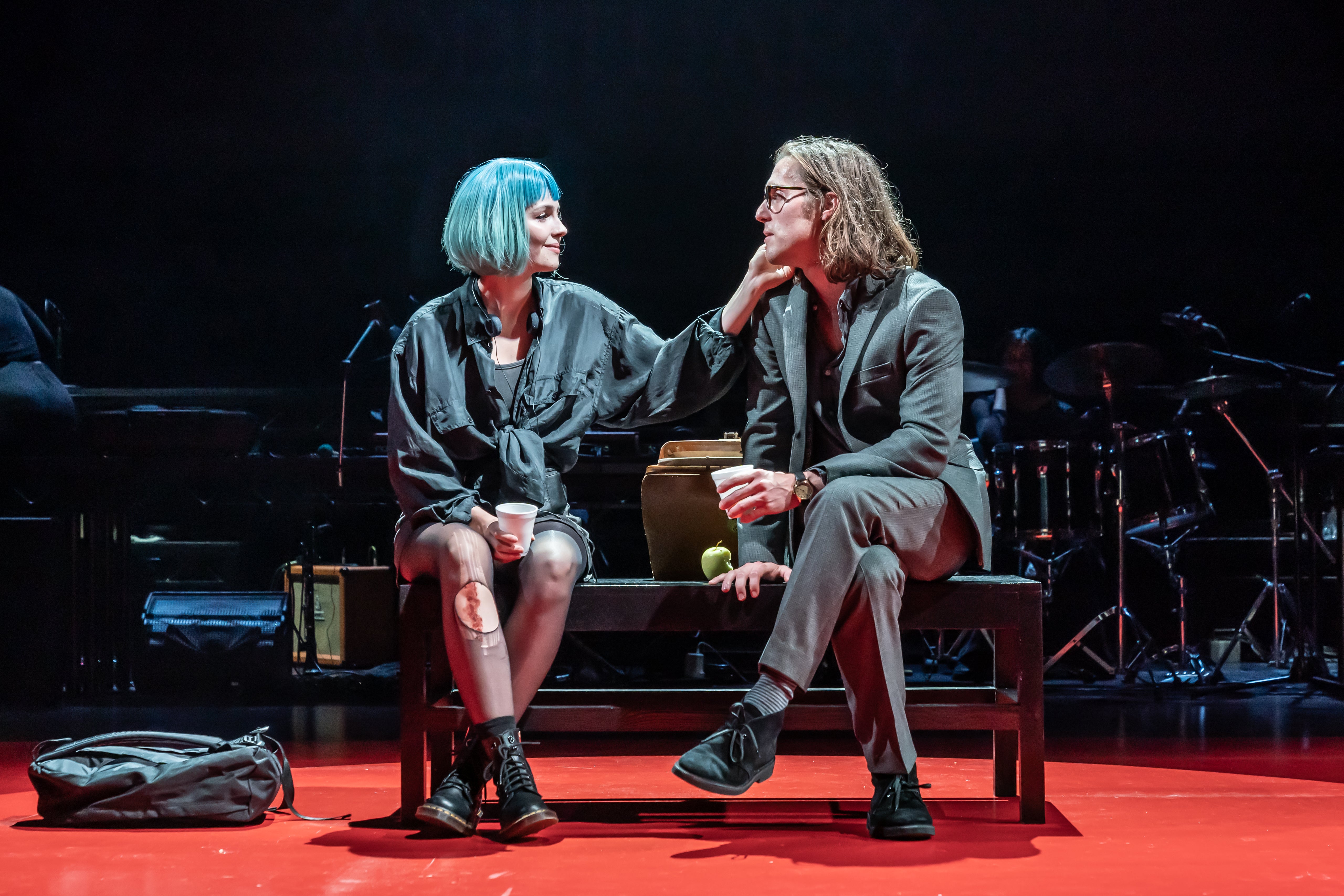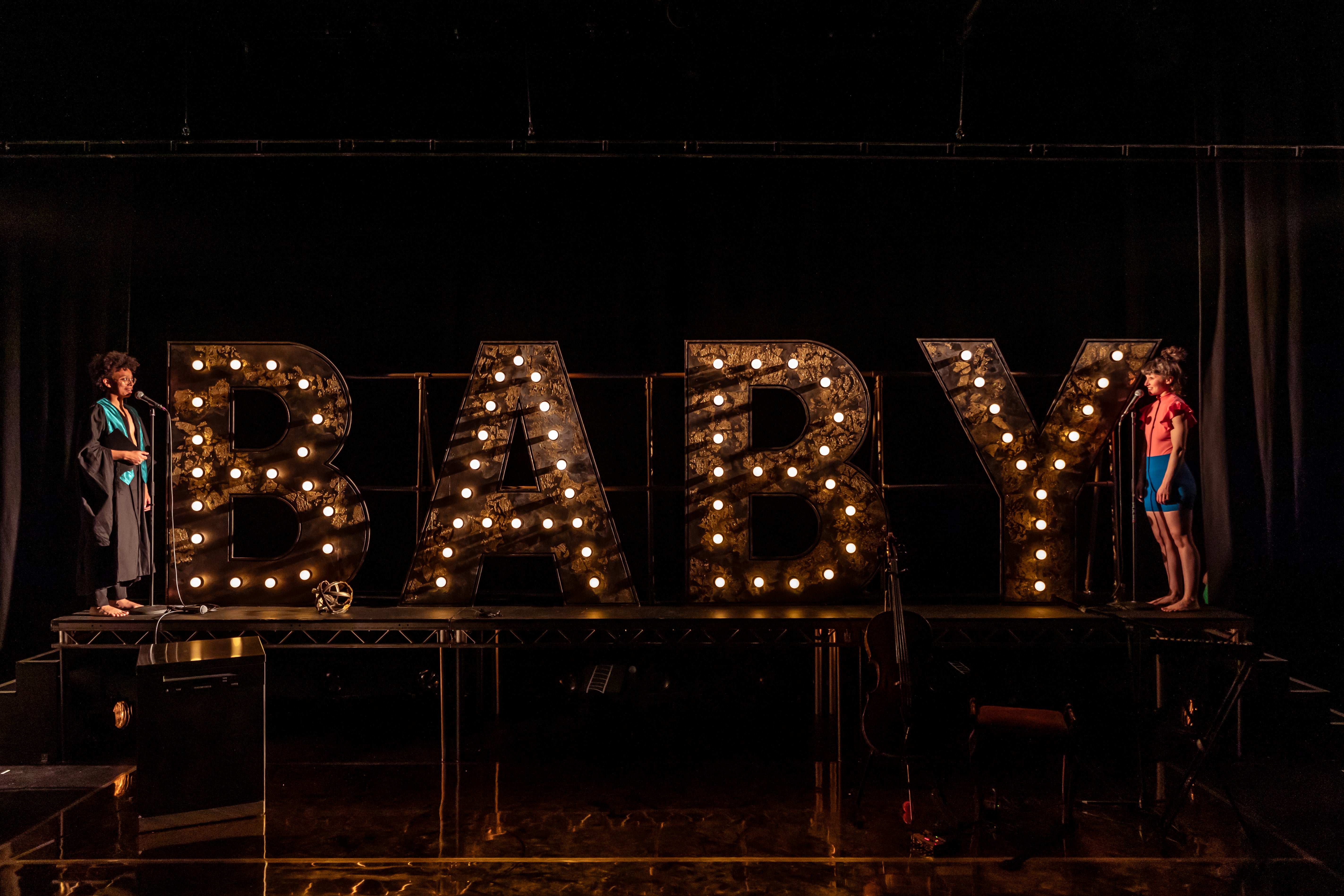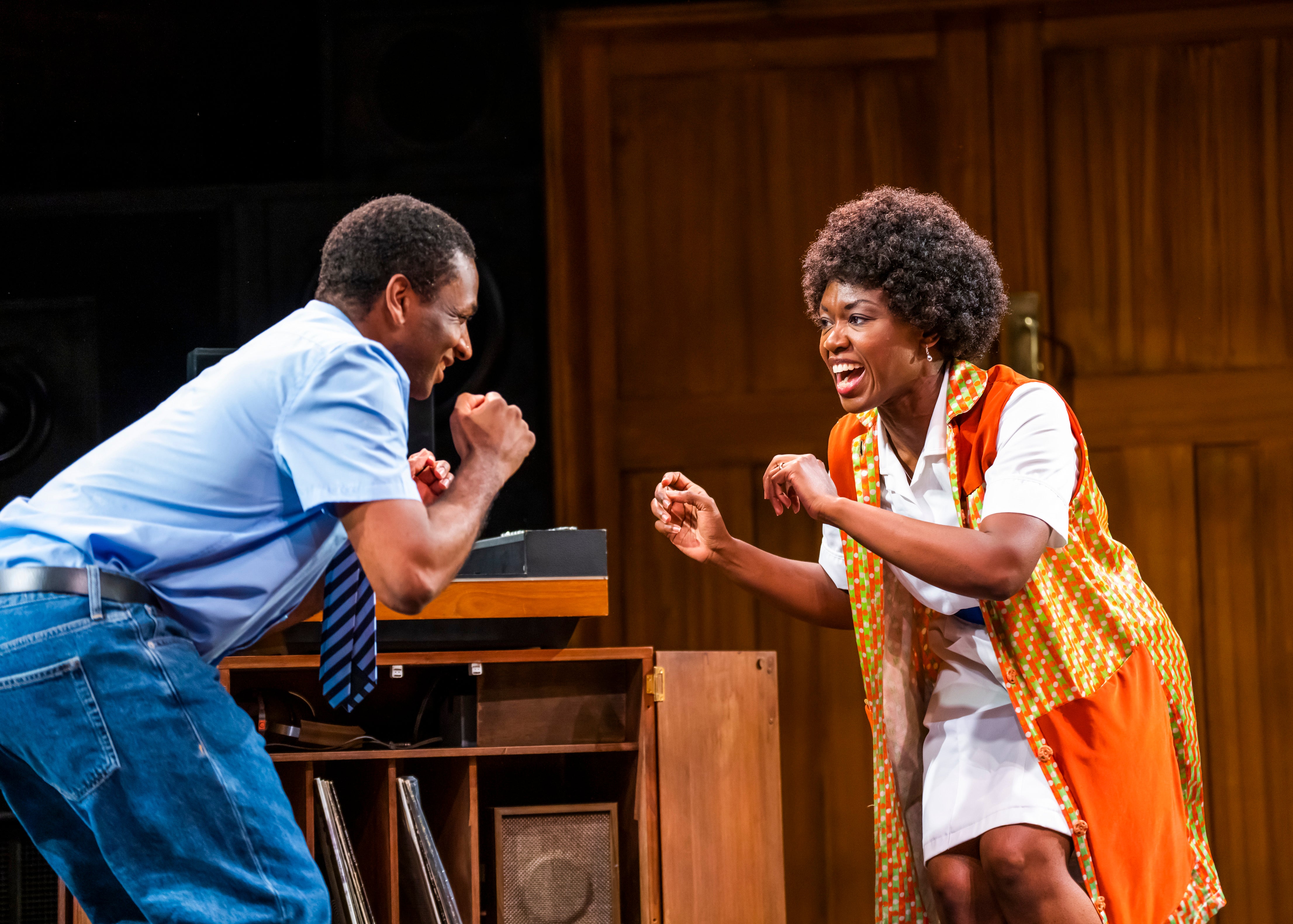The Week on Stage: From Much Ado About Nothing to Closer
A guide to the week’s theatre

Sexual politics dominates the stage this week, with stories of warring couples opening across London’s theatres. At the National, Katherine Parkinson and John Heffernan star as bickering Beatrice and Benedick in Much Ado About Nothing, while Patrick Marber’s steamy relationship drama Closer gets a revival at the Lyric Hammersmith. Elsewhere, experimental theatre company RashDash have a radical take on motherhood, and playwright Zodwa Nyoni explores family history at the Kiln.
Come back next week for our verdicts on Sister Act starring Jennifer Saunders, and a new musical adaptation of 101 Dalmations.
Much Ado About Nothing – National Theatre ★★★★☆
The National’s summertime Much Ado About Nothing really just wants to give us a good time. And it pretty much succeeds, thanks to the fact that it’s gentle, it looks gorgeous, and it gives us a handful of very good giggles. With Anna Fleischle’s Wes Anderson-inspired staging and the top-tier casting of Katherine Parkinson and John Heffernan as the warring lovers Beatrice and Benedick, it’s a very tasty proposition.
Simon Godwin, who is a frontrunner for the top job at the RSC, sets the action in 1930s Sicily in a fancy hotel. The war is over. Everyone basically wants to chill out, get a tan and get off with each other. Parkinson’s Beatrice is an actress, who arrives in a flurry of flashbulbs and wears a succession of sparkly, outlandish costumes. Here, Heffernan’s Benedick feels more like his own guy than the usual quipping boys’ club jester. There’s a depth to both performances, comical when they need to be and sincere when the stakes are high. Heffernan, in particular, nails a delirious set-piece as he tries to eavesdrop on his pals professing that Beatrice loves him. Elsewhere, Godwin leans into the laughter in pleasurable ways. Phoebe Horn’s winky Margaret is especially amusing, and David Fynn’s Dogberry is a hoot. There’s scampery music whenever someone is plotting something, which is… often.

The abrupt tonal shift, when Claudio (Eben Figueiredo) jilts Hero (Ioanna Kimbook) at the altar, is always tricky to navigate. But here it makes sense: this is a guy on holiday with his mates who thinks he’s found the one. He’s driven to fury because he feels humiliated. Hero’s shaming is the result of social pressure; her anxiety comes from the fear her future has been discarded. Basically, what I’m saying is, it’s Love Island.
It’s an unashamedly mainstream staging that’s very hard not to like. The fact that it opens a week after enjoyably daft comedy Jack Absolute Flies Again suggests that the National is doubling down on fun this summer. Times are hard and escapism is at a premium: it feels like they’ve understood the mood of the nation. Jessie Thompson
Closer – Lyric Hammersmith ★★☆☆☆
On the night I watched Closer, it was incredibly hot. The show, sadly, was not. Patrick Marber’s drama about a quartet of damaged, interlinked lovers, getting a 25th anniversary revival at Lyric Hammersmith, is infamously horny. It’s full of secret snogs, lingering erotic glances and lustily lent cigarettes. The couples argue explosively and then sneak off for one last shag. It should steam up the stage – but here, it doesn’t.
The DVD of Closer, a starry 2004 film, was a crucial possession for any self-respecting indie kid in the Noughties. But if this wasn’t you, all you need to know is: Dan (Jack Farthing) is a failed novelist. He’s going out with Alice (Ella Hunt), a manic pixie dream girl whose main profession is dying her hair different colours. Dan gets off with photographer Anna (Nina Toussaint-White), who ends up married to doctor Larry (Sam Troughton), but she keeps her affair going with Dan. Towards the end, Alice becomes a stripper, because she is a doomed, sexy woman. Marber has said that, at the time, he wanted to show “where love is at the moment”. If it were written now, they’d all be spending time on Esther Perel’s couch.

Clare Lizzimore’s production looks cool and meta; a bare stage with a live band amplifies that this is a piece of theatre. People dressed all in black float around at the back of scenes, for reasons that never become clear. It cranks up the nostalgia as a reminder that this is a period piece. In between scenes, Hunt bellows songs by Bjork, Portishead and the Smashing Pumpkins. The now iconic chatroom scene is an interesting curiosity. Dan, pretending to be Anna while talking to Larry, barely thinks as he clackily types things like “sit on my face, f*** boy”. The “net”, as they call it, seems like an innocent place, offering true anonymity – a mischievous but essentially inconsequential playground. Also out of step with our times is the way the men pester the women for sex. Marber’s pre-MeToo portrayal of aggressive male sexual entitlement looks prescient.
But the stylised, staccato dialogue is a challenge. People say things like “Do you hate me?”… “No. I adore you.” You need a certain kind of confidence to pull this off. Troughton is a standout as Larry, switching from gooey boyfriend to raging beast in a moment. But the problem is, the cast don’t have any chemistry. I needed to believe in their desperation to bang one another. It’s just not there. And it stops Closer from feeling like a timeless work on untrammelled desire and makes it seem dated and affected instead. It should sizzle; that it’s not sexy enough is a cardinal sin. JT
Oh Mother – Soho Theatre ★★★★☆
Society is finally ready to admit that motherhood is hard. But with that shift comes new cans of worms – ones that theatre company RashDash dive into in their new show. Are we now focusing too much on the negatives of parenting? And on the flip side: is it smug, even disrespectful to those who don’t have kids, to mention the moments of joy? Women, once again, can’t do anything right.
RashDash members Abbi Greenland and Helen Goalen greet us on stage dressed as Greek goddesses. There’s a violent crashing sound occurring behind them; they try not to let any panic show on their faces. But as the curtain drops, we’re greeted with chaos – the glowing words “baby” surrounded by toys and dirty nappies. This is parenting, kid. Buckle up.

Fans won’t be expecting a narrative-heavy show from RashDash (“Is there anything missing aside of a plot?” Greenland asks at one point). Instead, we see 15 different plays in one, exploring the pressures to have or not have children, all while remaining sexy and not being overwhelmed with fear. Greenland, Goalen and non-binary cellist Simone Seales play multiple roles: hopeless husbands dressed as bears, concerned friends, vaginas, and even babies themselves, swinging from each other’s bodies with impressive strength.
In its darkest moments, the show shares much DNA with Mum, Morgan Lloyd Malcolm’s play about perinatal depression. But it was Oh Mother’s unusual exploration of parenting a parent that floored me. Scenes of verbatim dialogue between Goalen and her mother with dementia, played by Seales, are as delicate as they are devastating. The message, that mothers come in many different forms, is a powerful one. Isobel Lewis
The Darkest Part of the Night – Kiln Theatre ★★★★☆
There’s nothing like the loss of a parent to uncover buried wounds from the past. For Shirley (Nadia Williams) and Dwight (Lee Phillips), their mother’s death takes them back to the three months in their childhood that changed them for ever. As Zodwa Nyoni’s elegant play shifts back and forth from 1980s to current-day Leeds, we learn about their deep bond – and how their family unit is threatened by racism, police brutality and mental health prejudice.

Dwight (played by Phillips throughout) has autism; where words are sometimes difficult, his younger self often uses music and dance to express himself. Though his mother Josephine (also played by Williams) and Young Shirley (Brianna Douglas) embrace his unique perspective, it’s a harder concept for dad Leroy (Andrew French) to grasp. He’s had decades to adjust to life in the UK after leaving Jamaica. A Black man who doesn’t behave in a way that the outside world deems acceptable, Leroy knows, is a Black man in danger. Those reasons become painfully clear when 11-year-old Dwight ventures out alone one evening.
As Young Shirley, Douglas is a bright light; her dynamic reactions draw the eye whenever she’s on stage and provides much of the play’s comic relief. But it’s Williams who is the grounding presence – as Josephine especially, she’s utterly moving in the way she advocates for Dwight when no one else will. Rich, absorbing and heartfelt, The Darkest Part of the Night is a real triumph. Nicole Vassell






Join our commenting forum
Join thought-provoking conversations, follow other Independent readers and see their replies
Comments